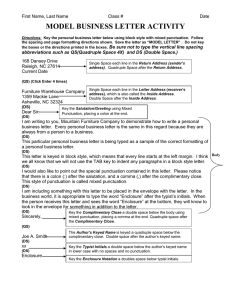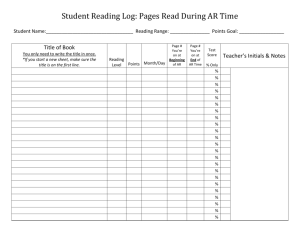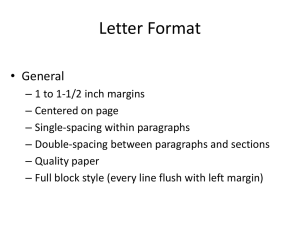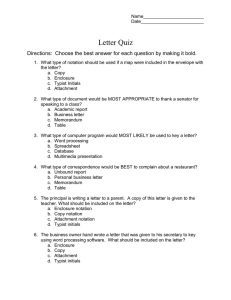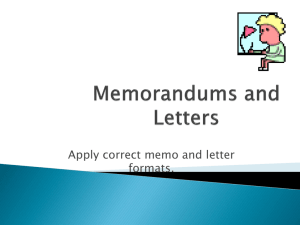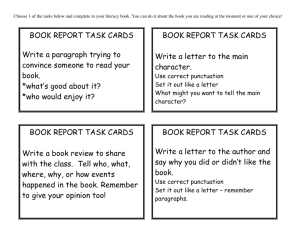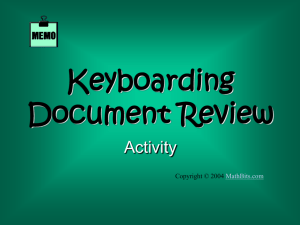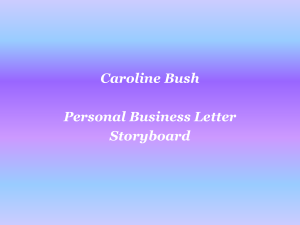Business Letter
advertisement
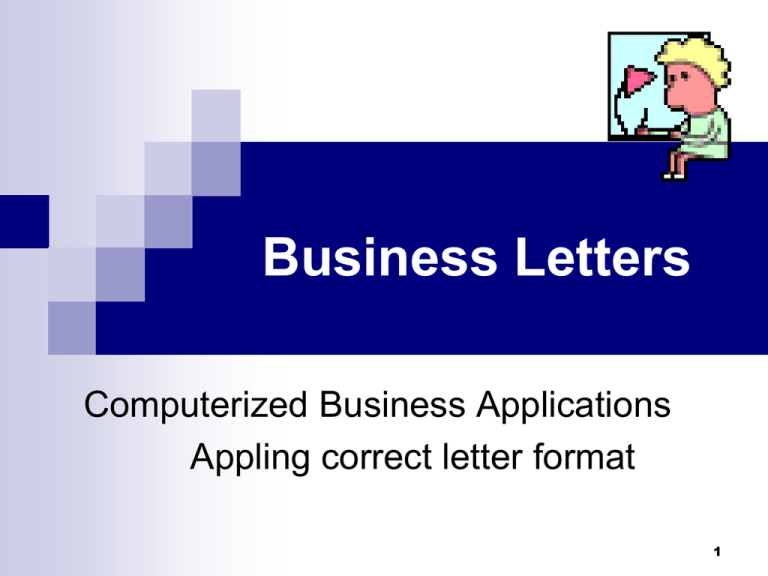
Business Letters Computerized Business Applications Appling correct letter format 1 Business Letters Personal—Business Letter A personal-business letter is a letter that is sent from an individual to a person or business/organization. Business Letter A business letter is sent from a business or organization to another or to an individual. Business letters are usually keyed on letterhead. The letterhead can consist of the business’ name, address, phone/fax/email, and logo. 2 Major Parts of a Letter 1. 2. 3. 4. 5. 6. 7. 8. 9. Return Address-the address of the person writing the letter. Letterhead if the letter is from a business. Dateline-Complete and current date. Letter Address/Inside Address-the address of the person receiving the letter. Salutation-the greeting of the letter. Example: Dear Sir or Madam: Body-the message of the letter. Complimentary Close-the ending of the letter. Example: Sincerely, Keyed Name-the authors typed name. Handwritten Signature-the author signs the letter after it has been printed. Typist Initials-initials of the typist. 04.03 6511 Keyboarding 3 Formatting a Letter Top margin of the first page on a letter is 2”. Margins: Succeeding pages have a 1” top margin. Side margins and Bottom margins are 1”. Block Style is one method of formatting a letter. In this style of letter writing all parts of the letter are keyed at the left margin. The 1st page of a letter is not numbered. All pages after the fist have page numbers .5” from the top of the page right aligned. Paragraphs should not be indented in this style of letter. Use a standard font style and font size i.e. Times New Roman/Arial and 12 point font. Single Space within paragraphs and double space between paragraphs. 4 Parts of a Block Style Letter Return address Letter address Date Salutation Body Complimentary Close Enclosure notation Writer Copy Notation—key a DS after the last line of the letter. 5 Punctuation Styles Open Punctuation There is not a colon or comma in the salutation and there is not a comma in the complimentary closing. Mixed Punctuation A colon is in the salutation and a comma is in the close. Example: Dear Ms. Smith Sincerely Example: Dear Ms. Smith: Sincerely, 6 Personal—Business Letter with Mixed Punctuation Return Address: The personal-business letter uses the return address with the dateline a single space beneath. Mixed Punctuation: The colon is keyed in the salutation and the comma is keyed in the complimentary close. 7 Business Letter with Open PunctuationLetterhead: The business letter uses letterhead instead of a return address, which consists of the business’ name, address, phone/fax/email, and logo. Open Punctuation: The colon is not keyed in the salutation and the comma is not keyed in the complimentary close. 8 Special Letter Parts Typist initials are used when someone other than the author types the letter. Typed a DS below the writer’s name, in lowercase letters, with no space or punctuation. Enclosure notation is used when additional items are included in the envelope with the letter. Attachment notation is used when additional items are clipped, stapled, etc… to the letter. Copy notation is used when a copy of the letter is sent to someone in addition to the addressee/letter address. 9 Block Style Letter with Special Parts • Typist Initial Typed a double space below the author’s keyed name. • Enclosure Notation Typed a double space below the typist initials. • Copy Notation Typed a double space below the enclosure notation. 10 Notes to Remember! A personal business letter is correspondence sent from an individual to a person or organization. A business letter is correspondence sent from a business to another business or to an individual. Because letterhead stationery is used, the return address is not keyed. The top margin is usually 2“, side and bottom margins are typically 1". Block format is one style of writing for personal-business and business letters in which all parts of the letter begin at the left margin. Typist initials are the initials of the typist and are used when someone other than the writer prepares the letter. Lowercase letters are used, with no space, and with no punctuation, appearing a double space below the signature. Enclosure/Attachment and Copy notations appear a double space below the typist initials. 11 Study Guide Questions Directions: • Use the PDF emailed to you, and answer the following questions. Assignment Questions: 1. What is the difference between a personal-business letter and a business letter? 2. What is letterhead? 3. Which part of a letter identifies the address of the person writing the letter? 4. Which part of a letter identifies the address of the person receiving the letter? 5. What would be an example of a greeting/salutation? 6. What would be an example of a complimentary close? 7. What is the body of a letter? 8. What is block style? 9. What is the line spacing in the body of a letter? 10. What is the line spacing after the dateline? 12 Study Guide Questions (cont’d) 11. What is the line spacing after the complimentary close? 12. What is the line spacing after the inside address? 13. What is the line spacing after the salutation? 14. What is the line spacing after the body? 15. If typist initials are included, what is the line spacing after the author’s keyed name? 16. What is the difference between open punctuation and mixed punctuation? 17. When would an enclosure notation be used in a letter? 18. When would a copy notation be used in a letter? 19. When would an attachment notation be used in a letter? 20. When would typist initials be included in a letter? 13
